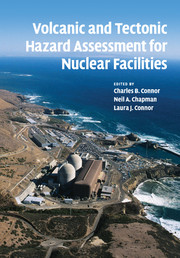Book contents
- Frontmatter
- Contents
- List of contributors
- Preface
- 1 Tectonic events and nuclear facilities
- 2 The nature of tectonic hazards
- 3 The nature of volcanism
- 4 Tectonic uplift and subsidence
- 5 Glacial isostatic adjustment: implications for glacially induced faulting and nuclear waste repositories
- 6 Using global positioning system data to assess tectonic hazards
- 7 Tectonic setting of volcanic centers in subduction zones: three-dimensional structure of mantle wedge and arc crust
- 8 Conceptual model for small-volume alkali basalt petrogenesis: implications for volcanic hazards at the proposed Yucca Mountain nuclear waste repository
- 9 Aspects of volcanic hazard assessment for the Bataan nuclear power plant, Luzon Peninsula, Philippines
- 10 Multi-disciplinary probabilistic tectonic hazard analysis
- 11 Tsunami hazard assessment
- 12 Regional-scale volcanology in support of site-specific investigations
- 13 Exploring long-term hazards using a Quaternary volcano database
- 14 Estimating spatial density with kernel methods
- 15 Cox process models for the estimation of long-term volcanic hazard
- 16 Spatial distribution of eruptive centers about the Idaho National Laboratory
- 17 Modeling the flow of basaltic magma into subsurface nuclear facilities
- 18 Intrusion dynamics for volatile-poor basaltic magma into subsurface nuclear installations
- 19 Volcanic risk assessment at Yucca Mountain, NV, USA: integration of geophysics, geology and modeling
- 20 Geological issues in practice: experience in siting US nuclear facilities
- 21 Characterizing active tectonic structures for nuclear facilities in Japan
- 22 Issues for coastal sites
- 23 Stable tectonic settings: designing site investigations to establish the tectonic basis for design and safety evaluation of geological repositories in Scandinavia
- 24 The impact of subsidence, uplift and erosion on geological repositories for radioactive wastes
- 25 Recommendations for assessing volcanic hazards at sites of nuclear installations
- 26 Formal expert assessment in probabilistic seismic and volcanic hazard analysis
- Index
- Map
26 - Formal expert assessment in probabilistic seismic and volcanic hazard analysis
Published online by Cambridge University Press: 27 May 2010
- Frontmatter
- Contents
- List of contributors
- Preface
- 1 Tectonic events and nuclear facilities
- 2 The nature of tectonic hazards
- 3 The nature of volcanism
- 4 Tectonic uplift and subsidence
- 5 Glacial isostatic adjustment: implications for glacially induced faulting and nuclear waste repositories
- 6 Using global positioning system data to assess tectonic hazards
- 7 Tectonic setting of volcanic centers in subduction zones: three-dimensional structure of mantle wedge and arc crust
- 8 Conceptual model for small-volume alkali basalt petrogenesis: implications for volcanic hazards at the proposed Yucca Mountain nuclear waste repository
- 9 Aspects of volcanic hazard assessment for the Bataan nuclear power plant, Luzon Peninsula, Philippines
- 10 Multi-disciplinary probabilistic tectonic hazard analysis
- 11 Tsunami hazard assessment
- 12 Regional-scale volcanology in support of site-specific investigations
- 13 Exploring long-term hazards using a Quaternary volcano database
- 14 Estimating spatial density with kernel methods
- 15 Cox process models for the estimation of long-term volcanic hazard
- 16 Spatial distribution of eruptive centers about the Idaho National Laboratory
- 17 Modeling the flow of basaltic magma into subsurface nuclear facilities
- 18 Intrusion dynamics for volatile-poor basaltic magma into subsurface nuclear installations
- 19 Volcanic risk assessment at Yucca Mountain, NV, USA: integration of geophysics, geology and modeling
- 20 Geological issues in practice: experience in siting US nuclear facilities
- 21 Characterizing active tectonic structures for nuclear facilities in Japan
- 22 Issues for coastal sites
- 23 Stable tectonic settings: designing site investigations to establish the tectonic basis for design and safety evaluation of geological repositories in Scandinavia
- 24 The impact of subsidence, uplift and erosion on geological repositories for radioactive wastes
- 25 Recommendations for assessing volcanic hazards at sites of nuclear installations
- 26 Formal expert assessment in probabilistic seismic and volcanic hazard analysis
- Index
- Map
Summary
Quantification of uncertainties is an essential component of probabilistic seismic and volcanic hazard assessments. Formal expert assessment is a structured and documented process for identifying and quantifying uncertainties. Expert judgment is used in any technical assessment, but often is implicit and undocumented. Formal expert assessment explicitly includes judgments of multiple experts to represent the range of views within the scientific community. We use the term “formal expert assessment” rather than the more common term “expert elicitation” to emphasize how this approach differs from the traditional view both in philosophy and in practice.
In a typical expert elicitation, subject-matter experts are asked narrowly defined questions about specific uncertain quantities within their area of expertise, and they provide their judgments in the form of probability estimates or distributions. For example a climate scientist might be asked to provide an estimate of “the equilibrium change in global average surface temperature” given a specific set of circumstances (Morgan and Keith, 1995). In this approach experts are treated as independent point estimators of an uncertain quantity, and the elicitation “problem” is viewed primarily in terms of determining how to ask the right questions as clearly as possible of the most knowledgeable experts. Under this perspective, the elicitors may focus significant effort on ensuring that they have wellcalibrated and informative experts; that is, experts who give both accurate estimates and a narrow range of uncertainty in estimates of quantities similar to those of interest but for which a “true” value can be determined (e.g. Chapter 10 of Bedford and Cooke, 2001).
- Type
- Chapter
- Information
- Volcanic and Tectonic Hazard Assessment for Nuclear Facilities , pp. 593 - 611Publisher: Cambridge University PressPrint publication year: 2009
- 3
- Cited by



